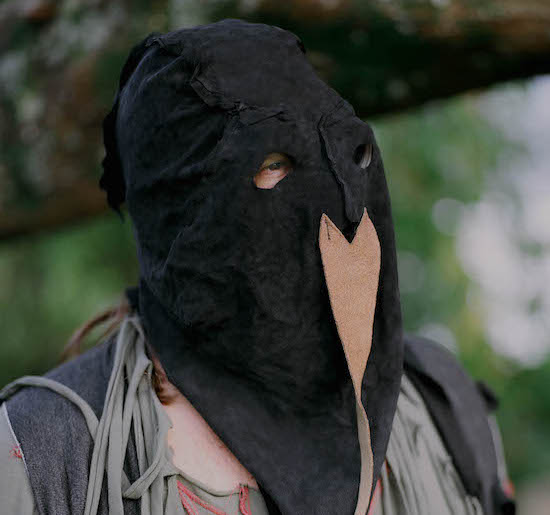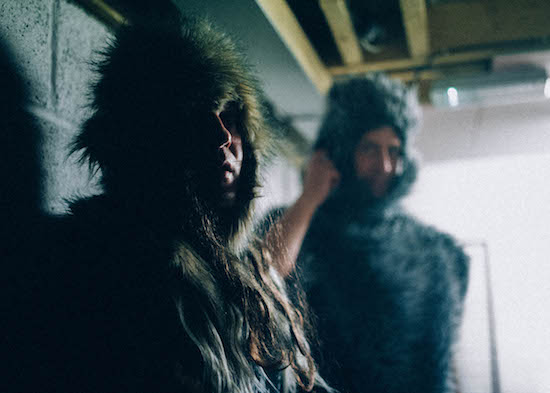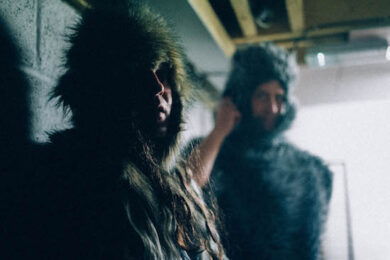On the whole I believe that quaintness is a good measuring post for a place’s mediocrity, and Devon’s own Totnes wears the guise of a stereotypically quaint British market town. It has the postcard-shop trappings of a holiday destination, and you might be led to believe that there was not much to Totnes for the experimental artist. But then you might also note the holidaymakers vocally bewildered at the presence of Sea Change-bound musicians sharing this miraculously sunny bank holiday with them. What becomes fantastically apparent is that Totnes, as well as being a cute provincial town, is a community tuned in to cultural shifts that are happening within it and outside of it. Beneath that quaint veneer, Totnes is a very modern community with an eye on progressiveness and sustainability, and Sea Change festival is undeniably a result of this attitude. It’s a festival that just wouldn’t work without local arts organisations and disparate venues getting enthusiastically involved. Totnes’ Drift Records is the main culprit here: this beloved record shop managed to put on Sea Change for a second year with zero Arts Council funding. It’s to them that I owe the following unique musical experiences.
Italian occult psychedelia has reached the shores of rainy England
Unit 23 is based on the outskirts of Totnes in the bend of an industrial complex – a fitting building for Mai Mai Mai, ambassador for Italian occult psychedelia, a genre which contains a group of Italian artists all influenced by Italian horror films, giallo and their soundtracks. Mai Mai Mai’s shuddering, ominous mechanical groove seems to have been created with Goblin’s soundtrack to Suspiria as a reference point. Behind the occult leader silhouette of Mai Mai Mai, panels on a screen depict distorted fields, abandoned buildings, brown foam slushing left to right and accelerating back again, as if attached to an invisible pendulum that moves according to the physics of the tide and the rhythmical noise that Mai Mai Mai create. This strange synchronisation of landscape visuals and sounds leaves one with a sense of uncanniness, like looking into a well and not being able to see the bottom.
The continuing story of men who stand in front of women at gigs
There are still so many environments where men feel it’s socially acceptable to express themselves at the expense of others. During Chris Forsyth & The Solar Motel Band’s performance, I found my view obstructed by tall men discussing the band without any thought to take their conversation elsewhere, as if the gig were for their appreciation only. It’s a boring story (and this is a mild case to boot) but it must be told over and over again until it ends.
This obstruction was annoying as the set was front-heavy in quality, starting with most of the tracks from The Rarity Of Experience. Forsyth is at his best when he demonstrates the melodic sensitivity that he could well have picked up from his time playing guitar with Television’s Richard Lloyd; he manages to get a gritty Marquee Moon-esque crunch out of a Fender Telecaster, avoiding any cliche observations between the Gibson and heavy rock. What’s more, he has the ability to not only instruct other musicians in the band, but also to be able to listen and respond well to their playing. Towards the end of the set however, the guitar riffs became a little less tightly wound, more sprawling, and it wasn’t always completely successful.

Feminist punk band ILL steer the Unit 23 crowd away from machismo
In Microsoft Word there’s a red typo underscore for “frontwoman” but not “frontman”. I can’t imagine Harri Shanahan, singer (or lead screamer) of ILL being particularly happy with that.
At that Chris Forsyth & The Solar Motel Band performance, men may have been taking up the space of Unit 23 but with ILL, Shanahan is striding around at the front of the stage like the hardcore punk vocalist she could so easily be. “This next song is about sexual harassment… in space,” Shanahan informs the audience. The cosmic context might be on the flippant side but the angst with which ILL communally scream into the crowd is a genuine act of defiance. They submerge the audience in female anger. The last track in their set is a particular standout, with a strong, Siouxsie & The Banshees guitar riff that loops throughout the song’s entirety.
Grumbling Fur are dance music for people bored with clubbing
I love the music of Hey Colossus and Jane Weaver, but there is only so much nodding to a motorik beat that you can do until you think that your head might spin off from your shoulders. A contrast to steady rhythm was found on Friday night with Grumbling Fur. Like with Talking Heads in Stop Making Sense (which screened on Saturday in Totnes’s newly refurbished cinema), Grumbling Fur create dance music which wouldn’t really work in a club – they can’t be described in the same way as say, Gold Panda, who played on the Thursday opening night, nor are they in the same bracket as leftfield techno. It’s a proggy type of dance music, taking influence from the more propulsive dimensions of Eno’s Before And After Science with swinging digitally enhanced percussion, violin and heavily processed bass drum sound. The songs they played, mostly from Furfour, would be apt on a Grumbling Fur Greatest Hits compilation – if such things would ever be financially lucrative in the Spotify era. There’s something very endearing about how happy their music sounds – although happiness here is always underlined with a psychedelic sinisterness. Onstage, their rabbit-shaped hats are a faux-naive contrast to the bland self-conscious maturity of the techno lad, and one can’t help but strongly approve of that.
Grumbling Fur pic courtesy of Aubrey Simpson; Mai Mai Mai pic courtesy of Jay Bing



